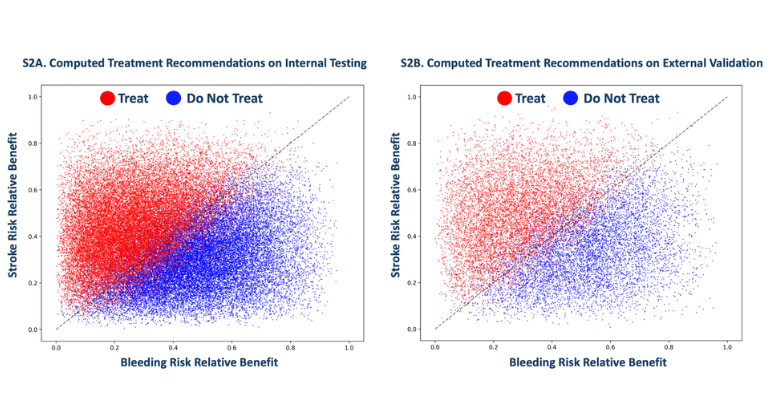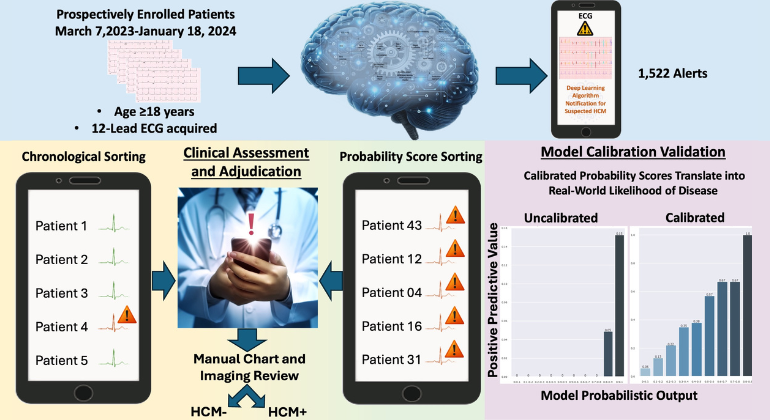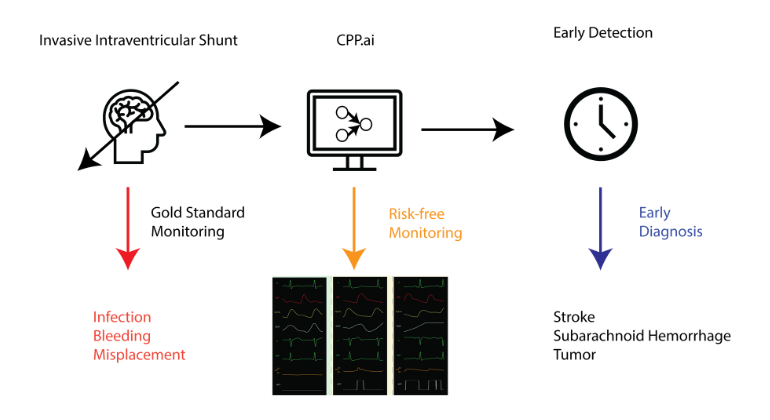What Is the Impact of Predictive AI in the Health Care Setting?
Findings underscore the need to track individuals affected by machine learning predictions

Models built on machine learning in health care can be victims of their own success, according to researchers at the Icahn School of Medicine and the University of Michigan.
Their study assessed the impact of implementing predictive models on the subsequent performance of those and other models. Their findings—that using the models to adjust how care is delivered can alter the baseline assumptions that the models were “trained” on, often for worse—were detailed in the October 9 online issue of Annals of Internal Medicine: https://www.acpjournals.org/doi/10.7326/M23-0949.
“We wanted to explore what happens when a machine learning model is deployed in a hospital and allowed to influence physician decisions for the overall benefit of patients,” says first and corresponding author Akhil Vaid, MD, Clinical Instructor of Data-Driven and Digital Medicine (D3M), part of the Department of Medicine at Icahn Mount Sinai. “For example, we sought to understand the broader consequences when a patient is spared from adverse outcomes like kidney damage or mortality. AI models possess the capacity to learn and establish correlations between incoming patient data and corresponding outcomes, but use of these models, by definition, can alter these relationships. Problems arise when these altered relationships are captured back into medical records.”
The study simulated critical care scenarios at two major health care institutions, the Mount Sinai Health System in New York and Beth Israel Deaconess Medical Center in Boston, analyzing 130,000 critical care admissions. The researchers investigated three key scenarios:
- Model retraining after initial use
Current practice suggests retraining models to address performance degradation over time. Retraining can improve performance initially by adapting to changing conditions, but the Mount Sinai study shows it can paradoxically lead to further degradation by disrupting the learned relationships between presentation and outcome.
- Creating a new model after one has already been in use
Following a model’s predictions can save patients from adverse outcomes such as sepsis. However, death may follow sepsis, and the model effectively works to prevent both. Any new models developed in the future for prediction of death will now also be subject to upset relationships as before. Since we do not know the exact relationships between all possible outcomes, any data from patients with machine-learning influenced care may be inappropriate to use in training further models.
- Concurrent use of two predictive models
If two models make simultaneous predictions, using one set of predictions renders the other obsolete. Therefore, predictions should be based on freshly gathered data, which can be costly or impractical.
“Our findings reinforce the complexities and challenges of maintaining predictive model performance in active clinical use,” says co-senior author Karandeep Singh, MD, Associate Professor of Learning Health Sciences, Internal Medicine, Urology, and Information at the University of Michigan. “Model performance can fall dramatically if patient populations change in their makeup. However, agreed-upon corrective measures may fall apart completely if we do not pay attention to what the models are doing—or more properly, what they are learning from.”
“We should not view predictive models as unreliable,” says co-senior author Girish Nadkarni, MD, MPH, Irene and Dr. Arthur M. Fishberg Professor of Medicine at Icahn Mount Sinai, Director of The Charles Bronfman Institute of Personalized Medicine, and System Chief of Data-Driven and Digital Medicine. “Instead, it's about recognizing that these tools require regular maintenance, understanding, and contextualization. Neglecting their performance and impact monitoring can undermine their effectiveness. We must use predictive models thoughtfully, just like any other medical tool. Learning health systems must pay heed to the fact that indiscriminate use of, and updates to, such models will cause false alarms, unnecessary testing, and increased costs.”
“We recommend that health systems promptly implement a system to track individuals impacted by machine learning predictions, and that the relevant governmental agencies issue guidelines,” says Dr. Vaid. “These findings are equally applicable outside of health care settings and extend to predictive models in general. As such, we live in a model-eat-model world where any naively deployed model can disrupt the function of current and future models, and eventually render itself useless.”
The paper is titled “Implications of the Use of Artificial Intelligence Predictive Models in Health Care Settings: A Simulation Study.”
The remaining authors are Ashwin Sawant, MD; Mayte Suarez-Farinas, PhD; Juhee Lee, MD; Sanjeev Kaul, MD; Patricia Kovatch, BS; Robert Freeman, RN; Joy Jiang, BS; Pushkala Jayaraman, MS; Zahi Fayad, PhD; Edgar Argulian, MD; Stamatios Lerakis, MD; Alexander W Charney, MD, PhD; Fei Wang, PhD; Matthew Levin, MD, PhD; Benjamin Glicksberg, PhD; Jagat Narula, MD, PhD; and Ira Hofer, MD.
The work was supported by Clinical and translational award for infrastructure UL1TR004419.
About the Icahn School of Medicine at Mount Sinai
The Icahn School of Medicine at Mount Sinai is internationally renowned for its outstanding research, educational, and clinical care programs. It is the sole academic partner for the eight- member hospitals* of the Mount Sinai Health System, one of the largest academic health systems in the United States, providing care to a large and diverse patient population.
Ranked 14th nationwide in National Institutes of Health (NIH) funding and among the 99th percentile in research dollars per investigator according to the Association of American Medical Colleges, Icahn Mount Sinai has a talented, productive, and successful faculty. More than 3,000 full-time scientists, educators, and clinicians work within and across 44 academic departments and 36 multidisciplinary institutes, a structure that facilitates tremendous collaboration and synergy. Our emphasis on translational research and therapeutics is evident in such diverse areas as genomics/big data, virology, neuroscience, cardiology, geriatrics, as well as gastrointestinal and liver diseases.
Icahn Mount Sinai offers highly competitive MD, PhD, and Master’s degree programs, with current enrollment of approximately 1,300 students. It has the largest graduate medical education program in the country, with more than 2,000 clinical residents and fellows training throughout the Health System. In addition, more than 550 postdoctoral research fellows are in training within the Health System.
A culture of innovation and discovery permeates every Icahn Mount Sinai program. Mount Sinai’s technology transfer office, one of the largest in the country, partners with faculty and trainees to pursue optimal commercialization of intellectual property to ensure that Mount Sinai discoveries and innovations translate into healthcare products and services that benefit the public.
Icahn Mount Sinai’s commitment to breakthrough science and clinical care is enhanced by academic affiliations that supplement and complement the School’s programs.
Through the Mount Sinai Innovation Partners (MSIP), the Health System facilitates the real-world application and commercialization of medical breakthroughs made at Mount Sinai. Additionally, MSIP develops research partnerships with industry leaders such as Merck & Co., AstraZeneca, Novo Nordisk, and others.
The Icahn School of Medicine at Mount Sinai is located in New York City on the border between the Upper East Side and East Harlem, and classroom teaching takes place on a campus facing Central Park. Icahn Mount Sinai’s location offers many opportunities to interact with and care for diverse communities. Learning extends well beyond the borders of our physical campus, to the eight hospitals of the Mount Sinai Health System, our academic affiliates, and globally.
-------------------------------------------------------
* Mount Sinai Health System member hospitals: The Mount Sinai Hospital; Mount Sinai Beth Israel; Mount Sinai Brooklyn; Mount Sinai Morningside; Mount Sinai Queens; Mount Sinai South Nassau; Mount Sinai West; and New York Eye and Ear Infirmary of Mount Sinai.
About the Mount Sinai Health System
Mount Sinai Health System is one of the largest academic medical systems in the New York metro area, with 48,000 employees working across seven hospitals, more than 400 outpatient practices, more than 600 research and clinical labs, a school of nursing, and a leading school of medicine and graduate education. Mount Sinai advances health for all people, everywhere, by taking on the most complex health care challenges of our time—discovering and applying new scientific learning and knowledge; developing safer, more effective treatments; educating the next generation of medical leaders and innovators; and supporting local communities by delivering high-quality care to all who need it.
Through the integration of its hospitals, labs, and schools, Mount Sinai offers comprehensive health care solutions from birth through geriatrics, leveraging innovative approaches such as artificial intelligence and informatics while keeping patients’ medical and emotional needs at the center of all treatment. The Health System includes approximately 9,000 primary and specialty care physicians and 10 free-standing joint-venture centers throughout the five boroughs of New York City, Westchester, Long Island, and Florida. Hospitals within the System are consistently ranked by Newsweek’s® “The World’s Best Smart Hospitals, Best in State Hospitals, World Best Hospitals and Best Specialty Hospitals” and by U.S. News & World Report's® “Best Hospitals” and “Best Children’s Hospitals.” The Mount Sinai Hospital is on the U.S. News & World Report® “Best Hospitals” Honor Roll for 2025-2026.
For more information, visit https://www.mountsinai.org or find Mount Sinai on Facebook, Instagram, LinkedIn, X, and YouTube.

AI System Finds Crucial Clues for Diagnoses in Electronic Health Records
Oct 15, 2025 View All Press Releases
Adding a Lookup Step Makes AI Better at Assigning Medical Diagnosis Codes
Sep 25, 2025 View All Press Releases
Like Humans, AI Can Jump to Conclusions, Mount Sinai Study Finds
Jul 22, 2025 View All Press Releases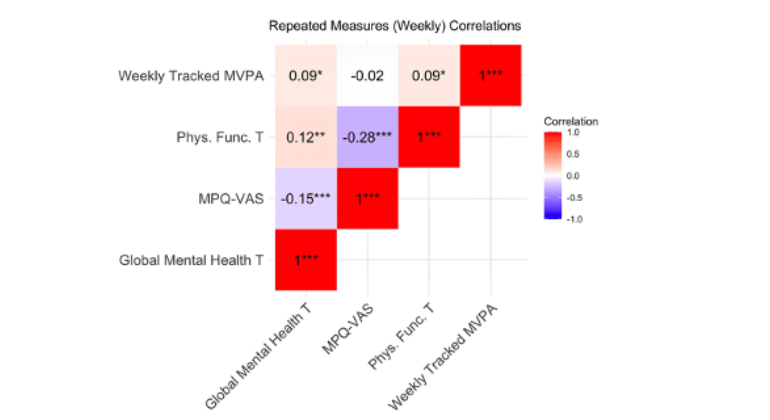
Physical Activity Boosts Mental Health in Women With Chronic Pelvic Pain Disorders
Feb 26, 2025 View All Press Releases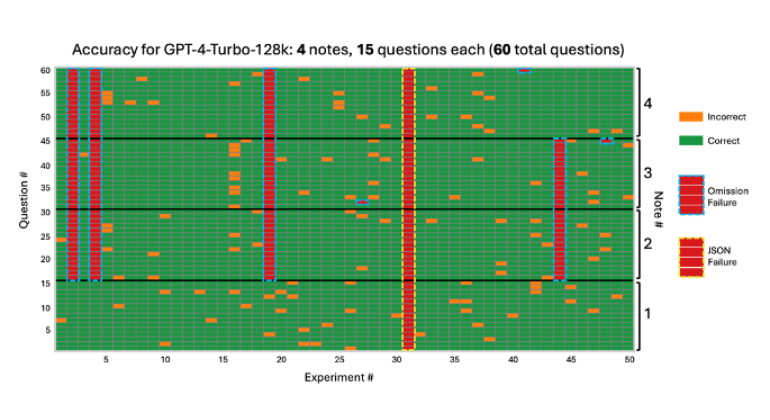
Study Identifies Strategy for AI Cost-Efficiency in Health Care Settings
Nov 18, 2024 View All Press Releases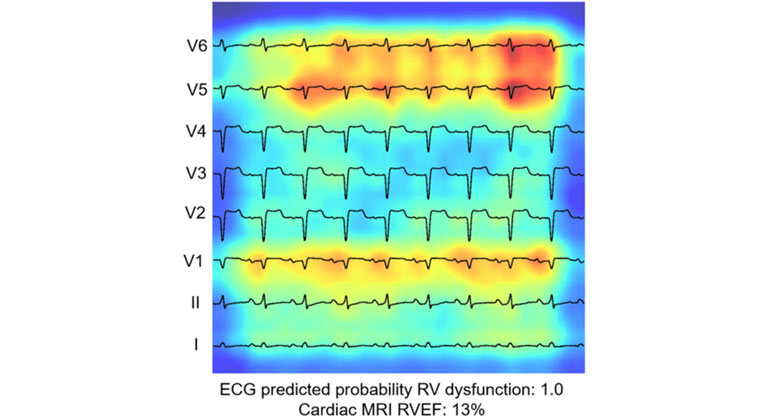
AI-Driven Study Redefines Right Heart Health Assessment With Novel Predictive Model
Jan 04, 2024 View All Press Releases